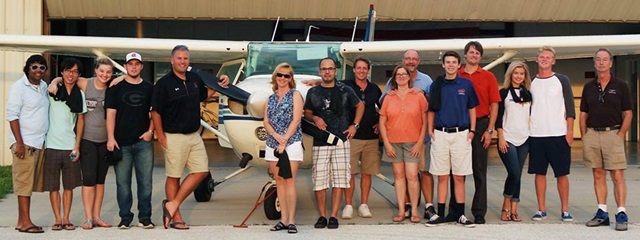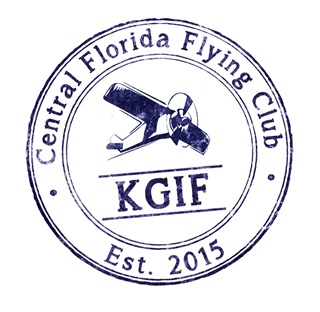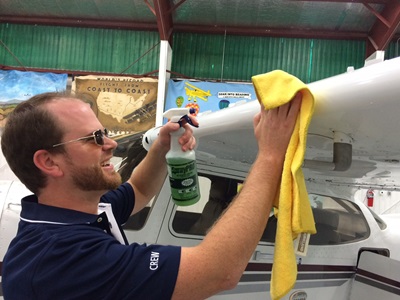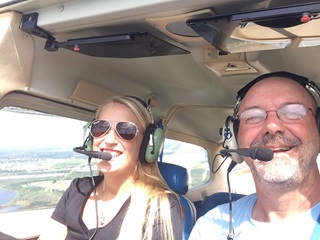 It’s not uncommon to see pilots cleaning bugs off the wings and windscreen after returning from a flight. Many pilots do this, but not everyone. If you’re a member of the Central Florida Flying Club (CFFC), you’d better get used to—it’s a requirement outlined in the club’s operating procedures.
It’s not uncommon to see pilots cleaning bugs off the wings and windscreen after returning from a flight. Many pilots do this, but not everyone. If you’re a member of the Central Florida Flying Club (CFFC), you’d better get used to—it’s a requirement outlined in the club’s operating procedures.
 The club, based at Gilbert Field in Winter Haven, Florida, formed this past summer with about 15 members and started operations with a leased Cessna 172. Its mission is to Fly More, Spend Less, Have Fun.
The club, based at Gilbert Field in Winter Haven, Florida, formed this past summer with about 15 members and started operations with a leased Cessna 172. Its mission is to Fly More, Spend Less, Have Fun.
A big part of fulfilling that mission is to create a culture of safety, respect, and camaraderie right from the start. One of the ways the CFFC is doing that is by adopting a policy of cleaning and tidying up the plane after every flight. Seatbelts get buckled back up across the seats, empty water bottles or other trash is thrown out, and the bugs are wiped off the wings and windscreen.
“It means the next person in the plane has a clean windscreen and the plane looks good,” club member and AOPA Ambassador Jamie Beckett said. “It’s a sign of respect for your fellow club members. That means that everybody that shows up gets a clean, tidy airplane that’s ready to go.”
Post-Flight Inspection Improves Safety

“If you see a fastener that loosened up on the airplane or you see a dent where you didn’t realize you hit a bird or something, you’re finding out now, not when the next person arrives to fly,” Jamie said.
If members find anything wrong, the policy is to call the club maintenance officer to notify him and he can make the decision on whether the airplane is safe or if the issue needs to be dealt with before the aircraft can fly again. It’s a way to address any issues immediately to keep the aircraft well maintained.
The airplane cleaning procedure is part of a new member’s check out with the club’s chief instructor, who also is the safety officer. He’ll ask questions like, ‘Do you know where the cleaning supplies are kept and how to clean the airplane? Do you know that you clean the plexiglass up and down, not in a circular motion?’ It provides members an opportunity to be taught how the club cares for the aircraft and who to call when they have a problem.
“In the club environment, when you establish that culture and say, ‘You know what, ignorance is the normal state. So let’s just talk to each other with a certain amount of respect. This is how we do it here. I understand you might have done it somewhere else differently, but this is how we do it here. And we need you to sign onto that,’” Jamie said.
“If you create a culture that’s beneficial to the unit, everything works out. If it’s kind of slap dash and everybody figures it out for themselves, eventually you have dissent and people become unhappy,” Jamie said. “Just saying it out loud in the beginning, putting it in your operating rules that tidying the plane after the flight is part of the rental process and everybody buys into it, life is good. That solves about 90 percent of your problems right there.”
Frequent Events and Free Ground School

Another way the club is creating camaraderie among members is through frequent events. Every Tuesday night the club holds a free Private Pilot Ground School for members. It is done in conjunction with MzeroA.com, an online ground school. CFFC has three CFIs and it works with the student’s schedule.
“The value of the club is that it’s a social organization that is mutually supportive of each other,” Jamie said. “We aren’t doing the standard ground school where we try to get you to memorize test answers. We’re building a body of knowledge. There is no time limit, if you miss a class it’s ok, we’ll do private tutoring with you. It’s about serving the member, not about serving the schedule.”
In addition to the weekly ground school, on the second Thursday of every month CFFC has a social night where they pull out the grill or order pizza and anyone is welcome to come. One of the members commented “how pleased he was that every time he comes to something there are four or five people he’s never met before,” Jamie said. “Sure enough, two people joined up last Thursday. It’s an amazing thing. It’s really gratifying. I’m not sure I expected that. The gratification, the satisfaction that you’re really doing something that is making general aviation more accessible and fun.”
Factsheet
|
Name |
Central Florida Flying Club |
|
Location |
Gilbert Field (KGIF), Winter Haven, FL |
|
Website |
|
|
Year formed |
July 2015 |
|
Aircraft |
1977 Cessna 172N Skyhawk ($94/hr) Rates are Hobbs time, wet. |
|
Joining fee |
$30 application fee |
|
Monthly dues |
$350 each year, plus $55 per month (which includes entire immediate family) |
|
Membership |
Approximately 15 |
|
Scheduler |
None yet |